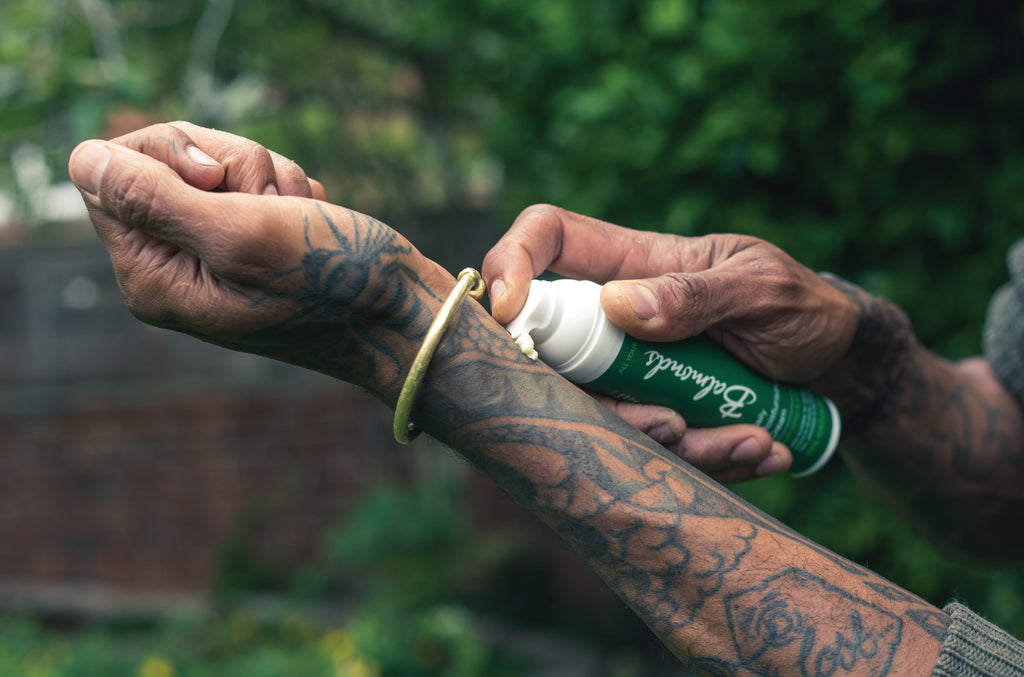
Taking care of your new tattoo is essential whether you’re vegan or not, but it’s certainly true that vegans have a bit of a narrower range of aftercare products to choose from. That’s because many of the traditional creams and salves recommended for protecting and healing new tattoos contain animal-derived waxes, the two most common being lanolin and beeswax.
Lanolin (found in both repurposed nappy creams and specialist tattoo balms) is a wax secreted by sheep to protect themselves from cold and damp. It does a good job of locking moisture into healing skin but can cause irritation to those who have a wool allergy, and is, of course, not at all vegan!
Beeswax is collected from farmed bee hives as a by-product of honey production; it can be produced more or less ethically, according to where in the world it comes from. Balmonds uses beeswax from a small-scale local family farm in our Skin Salvation ointment, but that means that, although it’s brilliant for tattoos, it’s not vegan.
So what can you use instead? Remember that the three main things you’re trying to accomplish is to keep new tattoos:
- Protected (from dirt, sun, physical contact, water etc; anything that could disturb the healing)
- Moisturised
- Free from inflammation (whether that’s from infection or from topical irritants)
So you need an aftercare product that will do all that. That means something that is free from additives that can cause itchiness or inflammation on extremely sensitive healing skin; something that will provide a decent barrier against dirt and moisture; something that will lock in moisture and keep the skin topped up with essential fatty acids, vitamins and nutrients it needs to heal itself.
Some people recommend just plain coconut oil, gently applied over the freshly-inked skin. This isn’t a bad option, as food grade coconut oil is free from fragrances, preservatives or any other synthetic additives. It can nourish the skin with vitamins and minerals and works as an emollient oil to keep the skin soft and hydrated. However, it doesn’t stay on terribly well and some people’s skin reacts to coconut.
Aloe vera gel is another good natural option. It can be used as a moisturiser that helps skin to heal, if you can get hold of the 100% natural gel that doesn’t contain any other additives. The downside to aloe vera is that like coconut it doesn’t absorb very well and needs to be reapplied frequently.
You can also use Balmonds Daily Moisturising Cream as a tattoo aftercare balm. It isn’t as oily as an ointment, but it is a really great moisturiser once you’ve removed any film your artist has advised you to keep on at first. Why’s it so good? Well, it’s packed with EFA-rich hemp seed oil to provide your healing skin with the nutrients and oils it needs to repair itself. It also contains naturally anti-inflammatory and anti-microbial herbs - chamomile, chickweed, nettle and calendula - to calm down any itchiness and keep the bugs at bay. Finally, it’s made with shea butter, a creamy natural moisturiser, which works beautifully to keep skin soft and hydrated.
Remember these simple steps to looking after new tattoos:
- Wash tattoos very gently before applying any cream or balm.
- Use an unfragranced vegan body wash and warm (not hot) water to clean the area
- Pat dry very gently with a kitchen towel
- Apply a small, thin layer of cream carefully over the tattoo - don’t rub it in!
- Reapply morning and evening for 30 days while the tattoo is healing
- STOP using any cream that makes you itch, or if you see redness, inflammation, spots or bumps
